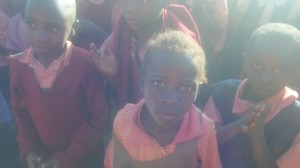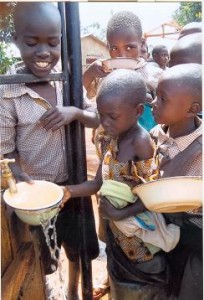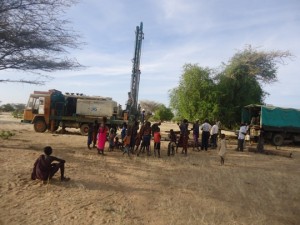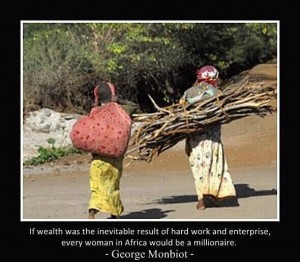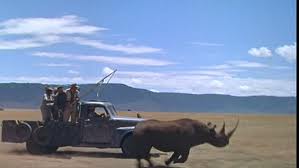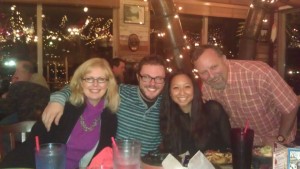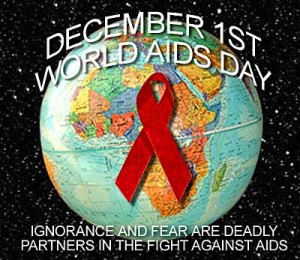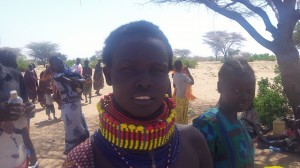
You always want to see things done right. And they were today. I love CRF. I love the way it helps people. And I have never seen it work better than today. I thank God for our Famine Relief Director, Francis Bii, and Maxson Kiptisya, our minister in Turkana. They don’t get any better. But you have to hear the story before you will understand why I am so thankful for them. So here it goes . . .
How can you not be a little bit afraid? It’s the worst famine in my lifetime. I have heard the stories of relief workers being kidnapped and the perils on the road, but we went anyway. Our trucks started nine hours before I left. I flew over the desert and joined them in Lodwar. As I peered out the window of the aircraft, I could see the scenery changing–it just kept getting more barren with each mile.
Getting out of the airplane, I could see the orange. All of our relief workers were lined up on the outside of the runway fence wearing shirts that said—“Orange is the Color of Hope.” I knew all of them with the exception of our new Turkana minister, Maxson. His shirt was a bit different. It was bright orange with a big white “CRF” on it.
Turkana is in the northwest corner of Kenya. Because of its remoteness, some don’t even consider it a part of Kenya. It is where the Turkana tribe lives, an extremely primitive and colorful people. And Turkana and Dadaab are two of the very worst areas in the whole Horn of Africa famine. The trip there was a journey into the middle of nowhere. I don’t know how our driver made it. There were no roads, and because of the drought the land is like sand. At times I wondered if our 4-wheel drive truck would sink in the sand, and we would have to push it. And it just kept getting drier and drier. I knew we were in trouble when we started passing the camels. I’ve been to Africa before—but this is like in the movies. This is where lions run wild. This is where you see the people in bright shades of dress and undress. As I got nearer to my destination, I saw their bright colors on the horizon. And you couldn’t count them. They were everywhere. And they were starving. And they had no water. The nearest water was a day’s journey. These were the world’s ultimate survivors.
It was so much like a scary movie except that it wasn’t a movie. When we got out of the truck, they surrounded us. Then they started singing. And I mean singing. It was that eerie kind of sound that you expect in the jungle. Only there was no jungle here—just desert.
All of us were excited about the same thing—water. They had none. We had just drilled a well there. But they waited until I got there to dedicate it before a single drop was going to enter anyone’s mouth. And they were prepared too. They had a big orange ribbon for me to cut on the pump of the new well. Where did they find an orange ribbon in the middle of nowhere?
The suspense was killing everyone. They couldn’t wait to taste the water. I was to be the first to pump the well. And I pumped. And I pumped. And no water came out. I had already been introduced as the one responsible. Would I be held responsible for no water? Surrounded by the crowd, I wondered what was going to happen to the giver of a dry well. But the tribe was cordial. They waited patiently as we disassembled the well to figure out what the problem was.
Since they were going to have to wait, the Turkana people decided to use the time for making speeches. They continually thanked CRF, contributors, and me for the water—even though there was none. They wouldn’t stop thanking us for what was yet to be seen.
Well, after the speeches, they were all reminded that even though there was no water, there was still food. Tons of it. So I got the privilege of handing out the food. We gave them heaping containers full of maize—no stingy portions.
And then to celebrate—it was a first-class, major dance. Have you ever seen movies where the Maasai dance? They yell, laugh, make funny noises but mainly jump up and down. And they jump up high! I don’t know exactly how it happened, but a group of the women grabbed me and pulled me into the dance. We jumped up and down for what seemed like a lifetime. I was hoping someone in the desert knew CPR. I was hoping that no one was filming this on video to blackmail me. And then they laughed and laughed and laughed. It was an event like no other in my time.
Do you remember when Jesus needed a second touch on the blind guy? Jesus touched him once, but he didn’t get all of his sight. He saw men as trees walking. And then Jesus touched him again, and all was well. Our well needed a second touch. We changed a part and put it all back together again. And when we pumped this time—water!!!!!
It was a free for all. People were diving and stretching and crowding just to get a drop of this precious water. Everything in their lives had changed in that moment.
It was a great gift to give to them. Our water projects in the Horn came from CRF, students, individuals, and churches—in other words, ordinary good people. But what a gift! They told me to tell all of you “Thank You!” We read together part of Psalm 107 that tells us that we have a God who can turn scorched land into flowing streams. And they raised their hands and shouted praises to our God.
I’ve decided that there is nothing better than giving. It is the essence of the gospel. It is John 3:16. It is the essential in a response to the gospel. But it is not only the pivotal part of a walk of faith; it is also the source of your own personal enjoyment and purpose.
But I don’t think you can ever understand giving if you are not willing to receive which is also John 3:16. So now it was my turn.
They brought me their greatest resource—a goat. In a barren land filled with starvation, how can you give up your goat? But I took it and put it in the back of the truck. I took it because I understand sacrifice. I know that the only way they will be whole is by also giving. And they wanted to give their best and most costly possession. Then they gave me their greatest product—a broom. It is what they are famous for—they make beautiful and effective brooms. It is their mainstay economically. They wanted to share what they were gifted in producing. And if that were not enough, they wanted to give me their greatest honor—the position of elder. They couldn’t make me a chief, but they could designate me to be their elder that is a position of esteem, honor, and favor. I was given the elder’s stick and declared an “elder” of the Turkanas. My great friend Audie also received the same position.
If all this were still not enough, they gave CRF land. Certainly it is desert land, but it is their land. We are going to let them farm our newly acquired land since we have water and can make a good start now with drip irrigation. We will pay them with food that they are helping produce themselves. Some day when the famine is over maybe we will produce a crop that is greater than their needs. Perhaps it will be sold. Maybe then there will be enough funds for their children to have a school.
What can you say? They gave their best. It’s not their fault that they are experiencing the worst famine in fifty years. They don’t want to be dependent on our gifts. But they are at the moment. I left wondering how we could do anything less than help these people. I love these people. They are now my people.
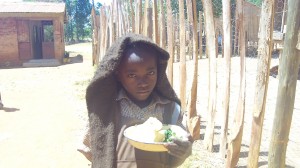 Sacrifice. It means that you give up something. But it means that you give up something that you miss. If I don’t really suffer a loss–it may be a gift, but it isn’t necessarily a sacrifice. Emmanuel makes sacrifices.
Sacrifice. It means that you give up something. But it means that you give up something that you miss. If I don’t really suffer a loss–it may be a gift, but it isn’t necessarily a sacrifice. Emmanuel makes sacrifices.
